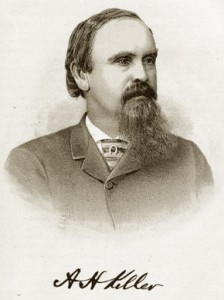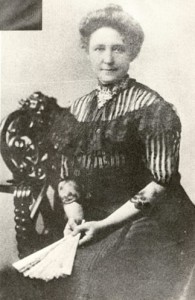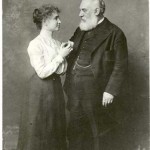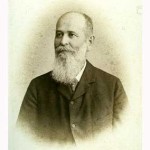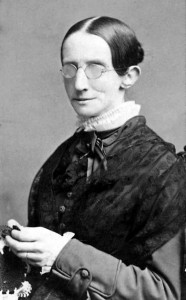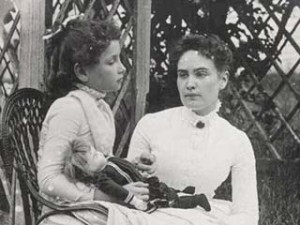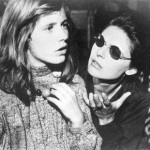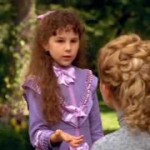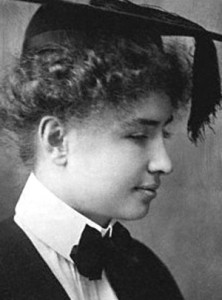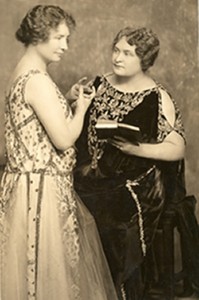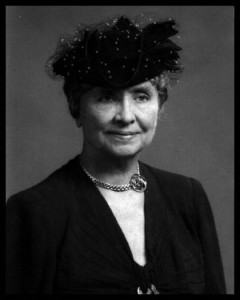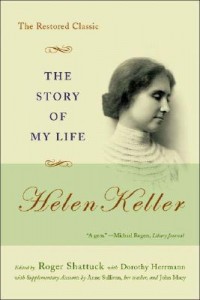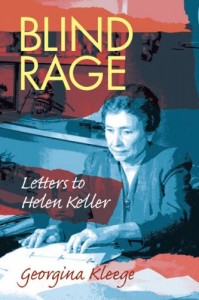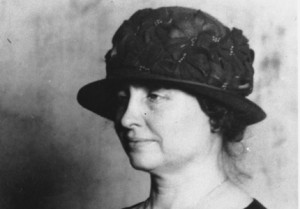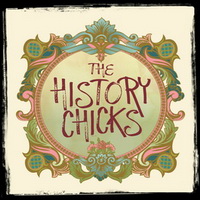A life of silence and darkness.
While that was the hand that the woman that we discuss in this episode was dealt, she actually lived a very loud, very colorful life. Although she was born well over 100 years ago, she is still held in lofty admiration by many today. Her life’s work of raising awareness to the challenges and unlimited abilities of the disabled changed perceptions, altered views and set in motion rights and change to society that is still being felt.
But Helen Keller was more than just a symbol of equality, a worldwide ambassador for the handicapped, and a figurehead for the American Foundation for the Blind; she was a writer, a public speaker, a daughter, a friend, and a woman. She invented her life, recreating and defining it not despite her disabilities, but with the support of them.
This woman had it going ON!
Helen Keller was born a very healthy baby on June 27, 1880, in, Tuscumbia AL, to Captain Arthur and Kate Adams Keller. The time was post-Civil War south. Her father had served in the Confederate Army, and her mother had roots in both the north and the south- but raised very much a smart, educated belle. Arthur had two sons from his first marriage that ended when his wife Sarah had died a year before he married Kate.
The Kellers were not wealthy, but they lived fairly well and Kate worked hard. Arthur? Well he worked…he owned a newspaper and oversaw the plantation where they lived, Ivy Green. The couple lived in the small cottage next to the big house. It doesn’t seem as if the marriage was all that cheery, but it was…um, well, how about “amiable”?
We talk more about the family dynamics during the podcast, how Helen was a bright baby, and about her early life. But at about 19 months old, Helen developed a fever. Scarlet fever or Meningitis, it’s not certain, but what is known is that when she recovered, she was both deaf and blind.
Of course we talk about what life was then like for the family. How they all tried to cope, and cure. We talk about the path to Anne Sullivan-via none other than Alexander Graham Bell, and (a man whose name Beckett can never say correctly, and Susan doesn’t really even attempt), Michael Anagnos, the head of the Perkins School for the Blind, in Boston.
We bust a commonly held misconception: Helen Keller was not the first deafblind person to learn to communicate via tactile communications. The woman who got the wheels turning and showed that it could be done so that Helen Keller could learn? Laura Bridgman.
Ok, well, TECHNICALLY, Laura Bridgman was not the first -that title (arguably) goes to Julia Brace quite a few years prior- but Laura is next, and important to our story today- she is at the Perkins School for the Blind when a young Anne Sullivan arrives.
See, Anne Sullivan was blind. By the time she gets to Helen, she has been trained as a teacher, has had some surgeries and sorta has some eyesight, but really it’s the—ok, we are too classy to go into that kinda talk- Anne can see, but not all that well.
As soon as Anne comes on Helen’s scene, Helen is almost 7, they connect pretty quickly, and really, for the next 50 years the stories of both women are so intertwined it’s almost impossible to tell the story of one without the other.
And we fail at that. We will give Anne her own space in the future, but, for this podcast, we do try to keep the spotlight on Helen. Try.
Helen and Anne begin this unusual relationship. Helen calls her “teacher”, and they move in together into the small house at Ivy Green. Helen had been given free rein of the place, sticking her hands in everyone’s dinner, doing whatever she wanted because it was easier for all that way. But Annie was having none of that. She quickly threw what the kind folks at Perkins had taught her out the window and started teaching to Helen’s strengths.
Once Helen’s learning catches on at the water pump, all the learning starts popping. Oh, you know the water pump, right? Anne spells W-A-T-E-R into Helen’s hand as the water from the pump is gushing and DING! She gets it!
But we leave the actual learning for a bit, to talk about the theatrical learning. Most of us have seen SOME version of The Miracle Worker. In 1962, Patty Duke starred as Helen Keller, then 17 years later, Patty Duke is in another version, but this time she is playing Anne Sullivan. There is a Disneyfied version even later, starring Hallie Kate Eisenberg ( but Patty doesn’t show up in that one).
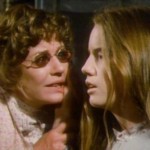
Patty Duke as Anne, Melissa Gilbert as Helen ( and what is up with the glasses? If you can find a picture of Anne with glasses, we would like to see it)
Back to Helen’s real life: Helen is a really bright girl, with a charming personality (now that she isn’t sticking her hands in everyone’s food), and possessing a thirst for knowledge and a desire to explore the world. The world is beginning to know her, so doors are opening and Anne and Helen walk through them on an adventure that takes them back to Boston and the Perkins school, to New York City and the Wright-Humason School for the Deaf, to Radcliffe and the first college degree issued to a deafblind person, to a career as a writer, to Hollywood, to the vaudeville stage, and really—all around the world. She meets dignitaries, explores socialism and becomes a suffragist, experiences worldwide cultures.
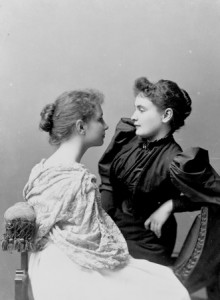
These two were pretty famous in the day, and a quick search will lead you to A LOT of pictures of them together.
Along the way she has a full life of not only typical experiences such as love, grief and worry about finances—but she really also creates a life that is unique to her and lives it the way that she sees fit. Of course, we fill those blanks on the podcast, introduce you to the third woman who Helen takes into her “family”, Polly Thomson. For fun we toss in some side chatter about her clothes, and homes, love life, and how many times this woman was photographed! It’s amazing, really.
In 1961, Helen Keller has a stroke and retires from public life. She is so frail that she cannot even attend the ceremony as President Johnson confers on her the Presidential Medal of Freedom, the nation’s highest civilian honor. On June 1st, 1968 at the age of 87, Helen Keller dies in her sleep, in her home- Arcan Ridge- in Connecticut. Her ashes are interred with those of Anne and Polly at The National Cathedral.
Her legacy lives on. Not only in the organization that she had spent a great deal of her life supporting, The American Foundation for the Blind, but in the advances for ALL people with physical limitations.
Time Travel With The History Chicks
If you want an easy tour, click on over to The American Foundation for the Blind- they have EVERYTHING Helen Keller. Pictures, history, more pictures—it’s all there. Just go. Take a few minutes, you will learn a lot.http://www.afb.org/Section.asp?SectionID=1
And to help with some head scratchers, there is also a National Federation for the Blind. (And we may have slipped up in the podcast and mixed the two– thus is the nature of organic discussions, and we apologize for any confusion). Anyway–they are a very active organization and you can find out more about them here: http://www.nfb.org/nfb/default.asp
Or click on her obit from the NY Times. It’s really a good read. http://www.nytimes.com/learning/general/onthisday/big/0601.html#article
And this link is kinda cool- it’s a video of Anne telling, and showing, how and why Helen puts her hands on Anne’s face when she talks. http://www.afb.org/braillebug/hkgallery.asp?tpid=3
If you find yourself near Tuscumbia AL, check out her birthplace. Ivy Green is open for tours, and showings of the play The Miracle Worker. http://www.helenkellerbirthplace.org/
And since you are planning a trip to Tuscumbia, plan it June 23-26, 2011 for the Helen Keller Festival. We hear Alabama is nice in the summer. Send us pictures, k? http://www.helenkellerfestival.com/
For the little learners, check out this online museum courtesy of the American Foundation for the Blind: http://www.afb.org/braillebug/hkmuseum.asp
The edition of book that Beckett recommended, Story of My Life, by Helen Keller, edited by Roger Shattock with contributions by Anne Sullivan and John Macy. Here is a link to read the original part online, http://digital.library.upenn.edu/women/keller/life/life.html
But if you want the book, which, you do, it looks like this.
And the book that Susan recommended, Blind Rage: Letters to Helen Keller by Georgina Kleege.
The Perkins School for the Blind is still open, the website is kind of interesting: http://www.perkins.org/inside-perkins/
Helen Keller, a remarkable, strong resilient woman with a unique vision for her life. We would all do well to do the same for our own.
As always, music for our podcast comes courtesy of Music Alley. Visit them at music.mevio.com.


